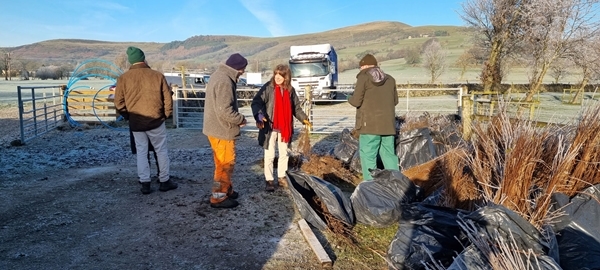- Hope Valley Farmers in Derbyshire and Bradfield Farmers Group in Yorkshire have teamed up to plant 31,000 hedge plants and 1,500 trees on their farms this winter.
- The farmers are part of the bigger PEF, an environmental cooperative launched in 2023 in partnership with the Game & Wildlife Conservation Trust (GWCT) and representing 77 farmers covering 40,000ha across the Dark Peak.
- The farmers plan to plant 24km of connecting hedgerow in four years in line with PEF aims of biodiversity recovery and net zero carbon by 2040.
Normally quiet at this time of year, Hope Showground in Derbyshire was recently a hive of activity as Peak District farmers collected over 31,000 hedge plants and 1,500 trees to plant on their farms this winter. The project, led by Peakland Environmental Farmers (PEF), will see members of the Hope Valley Farmers and Bradfield Farmers Groups establish over 6km of new hedgerow, creating valuable habitat corridors for wildlife, sequestering carbon and enhancing the landscape. This, combined with 10km already planted and 8km planned for next year, will make 24km in only four years.
 Hedgerow expert Jasper Prachek gives advice to Hope Valley farmer Denise Matthews as she prepares for planting on her farm.
Hedgerow expert Jasper Prachek gives advice to Hope Valley farmer Denise Matthews as she prepares for planting on her farm.
Tom Noel, local farmer and chair of PEF, says the project demonstrates that with the right support collaborative action for the environment by farmers can achieve nature recovery: “Our upland farms are a rare haven for several very rare species, so by linking habitats with new hedgerows our members are committing their own time and effort to create wildlife corridors.
He continued: “As a farmer-led environmental cooperative we plan to plant more hedgerows each year as part of a broader conservation plan, thereby hopefully meeting and beating government targets on biodiversity, carbon, clean air and water. We will achieve this at the same time as welcoming over 13 million visitors to our farms each year and contributing to national food security and thriving village communities in the Peak District.”
Plants donated by the Woodland Trust
Mark Priestley, a Hope Valley Farmers member, has been creating new hedges across his farm for several years now. He said: “We have created over 700m of new hedgerow in the last two years with Hope Valley Farmers. Ours is a former dairy farm so there was limited wildlife habitat across it, but we are gradually putting it back for nature.
“The boundaries on the farm were mainly fences before, so it is a great opportunity to plant hedges and create a network of wildlife corridors across the farm. We would not have been able to afford to do everything we have without this project,” Mark adds.
The hedge plants and trees were generously supplied by the Woodland Trust, which has provided plants for the last five years to farmers in the Hope Valley and Bradfield. Chloe Palmer, facilitator of the Hope Valley and Bradfield Farmers groups, is delighted with the positive partnership working demonstrated by this project.
She said: “Through our partnership with the Woodland Trust and the Peak District National Park’s Farming in Protected Landscape programme, almost 10km of new hedgerow have been planted in the last two years. This achievement demonstrates the enthusiasm and commitment of farmers to create wildlife habitat and to enhance their land. Each year this project has grown in scale and we are already planning ahead for 2024 when we hope to plant another 8km of new hedges.”
The PEF was launched in 2023 to help farmers access emerging natural capital markets, blending public and private sources of funding to replace the loss of Basic Payment Scheme subsidies and deliver nature recovery, carbon neutrality and clean river catchments. GWCT chief exec Teresa Dent CBE convened the PEF steering group with support from the NFU. She also sits on the board of Natural Capital Advisory (NCA), which provides brokering, auditing and monitoring services for PEF.
She said: “New cooperatives such as PEF are mobilising the farming sector to achieve nature recovery on the 72% of England which is farmed. Though many nature reserves are wonderful places, it will not be possible to reverse wildlife decline on those alone, as they cover only 8%. By proving it is possible to combine profitable agriculture with thriving biodiversity on a grand scale, the environmental cooperative model can show that farmers are not the problem, but the essential solution to hitting the government’s environmental targets. As the first 2030 deadline for delivery fast approaches, it’s more important than ever to seize the opportunity of investing in these groups.”